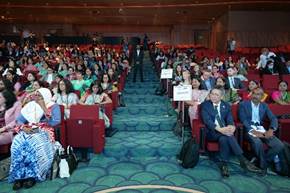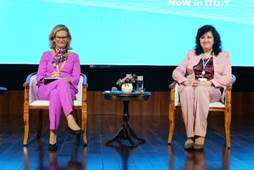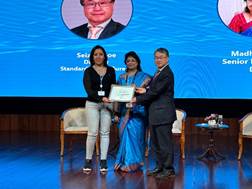The ITU-WTSA 24 which is being held in Delhi in collaboration with the Department of Telecommunications (DoT), Government of India, saw a landmark event yesterday, focused on promoting gender diversity in the field of telecommunication standardization. The special event, The Network of Womenin Standards (NoW), led by the Telecommunication Standardization Sector of the International Telecommunication Union (ITU-T), underscored the commitment to advancing women’s leadership roles in STEM and standardisation.This topic is particularly significant for India as the government is implementing various measures to create an inclusive technology sector and empower women through technology platforms, in line with the vision of the Prime Minister, Shri Narendra Modi, who advocates for women-led development. India is making progress in this area, with an increasing number of women co-founders in startups and over 40% of participants in STEM education being women. Initiatives such as Namo Drone Didi, Bank Sakhi, and Mahila E-Haat are empowering women to take on leadership roles in technology.
The Network of Women (NoW) in ITU-T, aligned with WTSA Resolution 55 (Rev. Geneva, 2022), is dedicated to fostering active female participation in standardization activities and ensuring a gender-inclusive approach across all ITU-T processes. This initiative is critical as the global push for digital inclusion accelerates, with women playing a pivotal role in shaping the future of technology.






In her opening remarks, Ms. Doreen Bogdan-Martin, Secretary General of the ITU, emphasized the importance of addressing gender imbalances in the field. She stated, “We can, and we must, increase the number of women in leadership roles, especially in our standards study groups. It’s crucial for women to step up, take the floor, and make their voices heard. This is what the Network of Women stands for—creating an environment where women feel empowered and supported. Mentorship plays a vital role in this transformation. It’s through mentoring, creating opportunities, and sharing our knowledge that we can truly progress. If there is no seat at the table, we must bring our own chair—and bring one more for those who will follow. Let’s continue pushing forward, lifting each other up, and ensuring that the digital future is shaped by all of humanity. Together, we can and will make real progress toward digital inclusion.”
Dr. Rim Belhassine-Cherif, Chair of NoW, ITU-T, and Chief Innovation and Strategy Officer responsible for Digital Transformation at Tunisie Télécom, highlighted the progress made in achieving gender balance at ITU-WTSA 2024. She noted, “One of the key objectives of ITU-WTSA 2024 was to promote gender-balanced delegations and increase the number of women in leadership roles, particularly as heads of delegations. Through various initiatives such as panel discussions, training sessions, tutorials, and the support of regional preparatory groups, we have achieved the highest-ever participation rate of women in ITU-WTSAhistory.”
The increasing involvement of women in ICT standardization is crucial as disruptive technologies such as Artificial Intelligence (AI) emerge. Women’s contributions can help ensure the development of inclusive, equitable, and sustainable standards that will drive technological progress for the benefit of all humanity.
The event featured a dynamic fireside chat, moderated by Doreen Bogdan-Martin, with Dr. Aminata Zerbo/Sabane, Minister of Digital Transition, Posts and Electronic Communications, Burkina Faso, and Neha Satak, Founder & CEO of Astrome. The discussion focused on closing the gender gap in Science, Technology, Engineering, and Mathematics (STEM) and in standardization. Panelists stressed the importance of a supportive environment and early capacity building to encourage more girls to pursue careers in tech.
Expert panelists examined and discussed the challenges surrounding gender equality in AI and shed light on incentives and opportunities for technical standards to support inclusive AI during panel discussion on “Standards for inclusive AI”. Also discussed were the ways to explore how standards could help address gender bias and ensure an equitable future. The session was moderated by Ms Susan Ferguson, UN Women India Representative and panelists were Prof Sandra Maximiano, Chair of the Board, Autoridade Nacional de Comunicações (Portugal’s national regulatory authority for the communications sector), Mr Vishnu Ram, AI expert, Vice Chair of ITU Focus Group on Autonomous Networks, Dr Alessandra Sala, Sr. Director of Artificial Intelligence and Data Science, Shutterstock, Global President of Women in AI, Dr Ebtesam Almazrouei, Founder and CEO of AIE3, Expert AI Executive and Tech Visionary Leader and MsPico Velazquez, founder & CEO at VIIRA, Computational Architect & Multiverse Thought Leader.
The session also recognised the leading women in ITU Standardisation. Mr. Seizo Onoe, Director, Telecommunication Standardization Bureau and Ms. Madhu Arora, Member, Technology/Digital Communication Commission, Department of Telecommunication, Ministry of Communications, Government of India felicitated Dr. Rim Belhassine-Cherif, Chief Innovation and Strategy Officer, TunisieTélécom, Tunisia; Dr. Hyoung Jun Kim, Vice Chair, NoW, Chair of ITU-T;Ms. Rebecca MukiteNoW in ITU-T Regional Representatives, Africa; Ms. Tania Villa, Federal Institute of Telecommunications (IFT), Mexico; Ms Basma Tawfik, International Organizations Manager National Telecom Regulatory Authority (NTRA), Egypt; Ms Miho Naganuma, TSAG Vice Chair, Senior Executive professional, NEC Corporation, Japan; Ms Maria Bolshakova, Acting Deputy Director General, Regional Commonwealth in the field of Communications (RCC), Russia; Ms Izabela Iglewska, Minister Advisor, Ministry of Digital Affairs, Poland; Additionally, member states from Cameroon, the Dominican Republic, Ghana and Europe were also felicitated for their high female participation rates in delegations.
ITU-WTSA 2024 continues to drive pivotal conversations on gender equality in telecommunications, addressing both statistical and stereotypical biases, mitigating biases, and promoting active participation of women in the telecom and tech sector.
WTSA 2024, organized by the International Telecommunication Union (ITU), serves as a platform for the development and implementation of global telecommunications standards, uniting regulators, industry leaders, and policymakers to shape the future of communications worldwide.

Comments are closed.